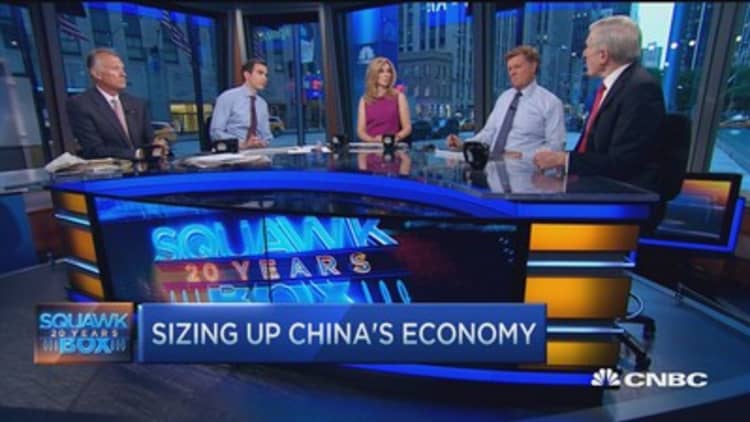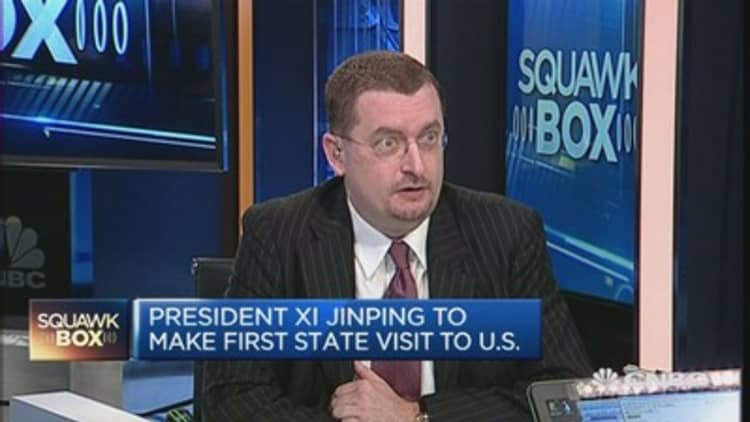


China may be compounding its own problems by the way its leaders talk about them.
With the country's growth a concern for global markets, investors are trying to fathom the depth of China's economic issues and understand what authorities are doing.
Analysts say it is difficult to discern what's really going on there and that the economy has always been difficult to measure.
But China's leadership isn't helping.
Ahead of his U.S. visit that kicked off Tuesday, Chinese President Xi Jinping said in an interview with The Wall Street Journal that recent intervention in capital markets was necessary or normal and that China is still on track to transform its economy.
Read MorePresident Xi: China is a big ship hitting rough seas
"I think they are mostly nothing new and simply a repeat of what other officials have said," Ilya Feygin, managing director at WallachBeth Capital, said of Xi's comments.
Sticking to policy lines casts doubt for many on whether Chinese leaders have a grip on maneuvering the country's economic transition in a way that doesn't shock global markets more than it already has.
"I think it's a combination of missteps that add up to a lot of worries, capacity of the Chinese government to manage its economy through a very challenging environment and not making it worse," said Scott Kennedy of the Center for Strategic and International Studies. "It begins with their intervention to push up their stock market last year."
Rapid-fire policy changes in the last few months have befuddled outsiders on Chinese leaders' intentions, which raise real concern on whether the world's second-largest economy can make a timely transition from a manufacturing hub to a consumer-oriented system.
Read MoreWhat China's president must do on US visit
"The point is to recognize there's a structural transition going on," said Arthur Kroeber, head of research at Gavekal Dragonomics. "And the problem we have is the data we have on the bad part of the economy is actually pretty developed. The data on services (is) much better but fuzzier."
Most of the economic reports still focus on manufacturing-related aspects of the economy, such as electricity use and the producer price index. Data such as the provide some light on services, which continued to hold above the 50 expansion/contraction line in August. Manufacturing PMI fell below that line.
Growth in the services sector has outpaced that of the manufacturing sector in the last year and a half, according to the latest National Bureau of Statistics of China data compiled by Wind information.
Amid the transition, questions also surround the accuracy of China's reports on headline GDP growth. The official figure is 7 percent, the slowest in more than two decades
In a report Tuesday, the Asian Development Bank lowered its forecast for Chinese growth in 2015 to 6.8 percent from 7.2 percent previously. Other analyst estimates range from 2 to 4 percentage points lower.
Slowing growth may be an old story, but markets continue to react on a day-to-day basis.
"Either way, (the U.S. and China) both stand to lose if communication doesn't get much better … because of how quickly financial markets react to news or dearth of news," Kennedy said.
The ADB report pointed out the specific impact of China's slowing growth on its Asian neighbors: "For a 0.2 percentage point decline in the PRC's growth, Mongolia, shipping copper, will register an estimated GDP growth decline of 2.7 percentage points. Kazakhstan, piping oil, will lose an estimated 0.5 percentage points."
The ADB said Thursday that "these country-specific figures have now been removed from the report entirely."
Credit Suisse also on Tuesday heavily cut China demand assumptions, commodity prices and earnings estimates, battering commodities and the mining sector.
Copper plummeted more than 3.5 percent, while mining stocks such as Glencore fell more than 10 percent.
According to the transcript of his interview with The Wall Street Journal, Xi said problems of pressure on the economy are "in the course of progress."
"Investors will come to a right judgment if they have a full understanding of China's progress in economic development since the start of reform and opening-up, of China's strategies formulated recently to ensure sustained and steady growth, and of the relevant data and trends in China's economic performance," Xi said.
But the basis of the Communist regime is that no one has a right to know anything, analysts said.
Read MoreXi has a chance to clarify China role on world stage
The Chinese authorities are "very much concerned about protecting information," Kennedy said. "What is critical for investors might be off limits."


